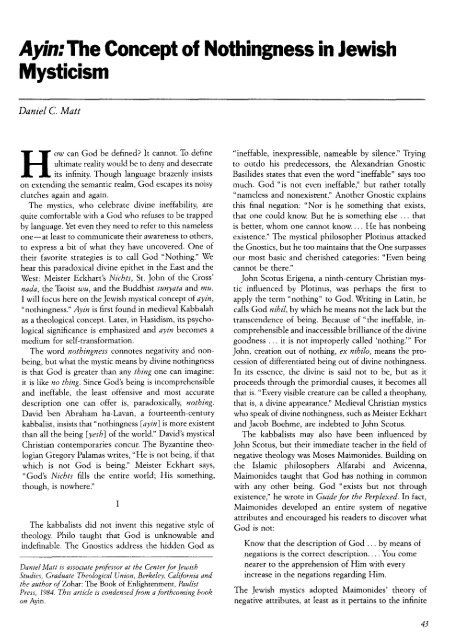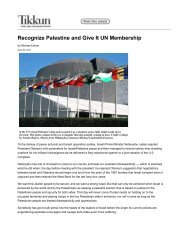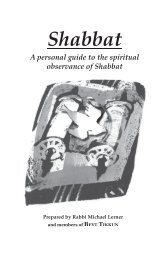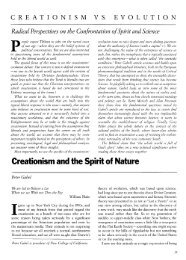Ayin:The Concept of Nothingness in Jewish Mysticism
Ayin:The Concept of Nothingness in Jewish Mysticism
Ayin:The Concept of Nothingness in Jewish Mysticism
Create successful ePaper yourself
Turn your PDF publications into a flip-book with our unique Google optimized e-Paper software.
<strong>Ay<strong>in</strong></strong>:<strong>The</strong> <strong>Concept</strong> <strong>of</strong> <strong>Noth<strong>in</strong>gness</strong> <strong>in</strong> <strong>Jewish</strong><br />
<strong>Mysticism</strong><br />
Daniel C. Matt<br />
ow can God be def<strong>in</strong>ed? It cannot. To def<strong>in</strong>e<br />
ultimate reality would be to deny and desecrate<br />
its <strong>in</strong>f<strong>in</strong>ity. Though language brazenly <strong>in</strong>sists<br />
on extend<strong>in</strong>g the semantic realm, God escapes its noisy<br />
clutches aga<strong>in</strong> and aga<strong>in</strong>.<br />
<strong>The</strong> mystics, who celebrate div<strong>in</strong>e <strong>in</strong>effability, are<br />
quite comfortable with a God who refuses to be trapped<br />
by language. Yet even they need to refer to this nameless<br />
one-at least to communicate their awareness to others.<br />
to express a bit <strong>of</strong> what they have uncovered. One <strong>of</strong><br />
their favorite strategies is to call God "Noth<strong>in</strong>g." We<br />
hear this paradoxical div<strong>in</strong>e epithet <strong>in</strong> the East and the<br />
West: Meister Eckhart's Nichts, St. John <strong>of</strong> the Cross'<br />
nada, the Taoist wu, and the Buddhist sunyata and mu.<br />
I will focus here on the <strong>Jewish</strong> mystical concept <strong>of</strong> ayzn,<br />
"noth<strong>in</strong>gness." Ayzn is first found <strong>in</strong> medieval Kabbalah<br />
as a theological concept. Later, <strong>in</strong> Hasidism, its psychological<br />
significance is emphasized and ay<strong>in</strong> becomes a<br />
medium for self-transformation.<br />
<strong>The</strong> word noth<strong>in</strong>gness connotes negativity and nonbe<strong>in</strong>g,<br />
but what the mystic means by div<strong>in</strong>e noth<strong>in</strong>gness<br />
is that God is greater than any th<strong>in</strong>g one can imag<strong>in</strong>e:<br />
it is like no th<strong>in</strong>g. S<strong>in</strong>ce God's be<strong>in</strong>g is <strong>in</strong>comprehensible<br />
and <strong>in</strong>effable, the least <strong>of</strong>fensive and most accurate<br />
description one can <strong>of</strong>fer is, paradoxically, noth<strong>in</strong>g<br />
David ben Abraham ha-Lavan, a fourteenth-century<br />
kabbalist, <strong>in</strong>sists that "noth<strong>in</strong>gness [ayzn] is more existent<br />
than all the be<strong>in</strong>g [yesh] <strong>of</strong> the world." David's mystical<br />
Christian contemporaries concur. <strong>The</strong> Byzant<strong>in</strong>e theologian<br />
Gregory Palamas writes, "He is not be<strong>in</strong>g, if that<br />
which is not God is be<strong>in</strong>g." Meister Eckhart says,<br />
"God's Nichts fills the entire world; His someth<strong>in</strong>g,<br />
though, is nowhere."<br />
<strong>The</strong> kabbalists did not <strong>in</strong>vent this negative style <strong>of</strong><br />
theology. Philo taught that God is unknowable and<br />
<strong>in</strong>def<strong>in</strong>able. <strong>The</strong> Gnostics address the hidden God as<br />
Daniel Matt is associate pr<strong>of</strong>essor at the Center for <strong>Jewish</strong><br />
Studies, Graduate <strong>The</strong>ological Union, Berkeley, California and<br />
the author <strong>of</strong> Zohar: <strong>The</strong> Book <strong>of</strong> Enlightenment, Paulist<br />
Press, 1984. This article is condensed from a forthcom<strong>in</strong>g book<br />
on <strong>Ay<strong>in</strong></strong>.<br />
"<strong>in</strong>effable, <strong>in</strong>expressible, nameable by silence." Try<strong>in</strong>g<br />
to outdo his predecessors, the Alexandrian Gnostic<br />
Basilides states that even the word "<strong>in</strong>effable" says too<br />
much. God "is not even <strong>in</strong>effable," but rather totally<br />
"nameless and nonexistent." Another Gnostic expla<strong>in</strong>s<br />
this f<strong>in</strong>al negation: "Nor is he someth<strong>in</strong>g that exists,<br />
that one could know. But he is someth<strong>in</strong>g else . . . that<br />
is better, whom one cannot know.. . . He has nonbe<strong>in</strong>g<br />
existence." <strong>The</strong> mystical philosopher Plot<strong>in</strong>us attacked<br />
the Gnostics, but he too ma<strong>in</strong>ta<strong>in</strong>s that the One surpasses<br />
our most basic and cherished categories: "Even be<strong>in</strong>g<br />
cannot be there."<br />
John Scotus Erigena, a n<strong>in</strong>th-century Christian mystic<br />
<strong>in</strong>fluenced by Plot<strong>in</strong>us, was perhaps the first to<br />
apply the term "noth<strong>in</strong>g" to God. Writ<strong>in</strong>g <strong>in</strong> Lat<strong>in</strong>, he<br />
calls God nihil, by which he means not the lack but the<br />
transcendence <strong>of</strong> be<strong>in</strong>g. Because <strong>of</strong> "the <strong>in</strong>effable, <strong>in</strong>comprehensible<br />
and <strong>in</strong>accessible brilliance <strong>of</strong> the div<strong>in</strong>e<br />
goodness . . . it is not improperly called 'noth<strong>in</strong>g.'" For<br />
John, creation out <strong>of</strong> noth<strong>in</strong>g, ex nihzlo, means the procession<br />
<strong>of</strong> differentiated be<strong>in</strong>g out <strong>of</strong> div<strong>in</strong>e noth<strong>in</strong>gness.<br />
In its essence, the div<strong>in</strong>e is said not to be, but as it<br />
proceeds through the primordial causes, it becomes all<br />
that is. "Every visible creature can be called a theophany,<br />
that is, a div<strong>in</strong>e appearance." Medieval Christian mystics<br />
who speak <strong>of</strong> div<strong>in</strong>e noth<strong>in</strong>gness, such as Meister Eckhart<br />
and Jacob Boehme, are <strong>in</strong>debted to John Scotus.<br />
<strong>The</strong> kabbalists may also have been <strong>in</strong>fluenced by<br />
John Scotus, but their immediate teacher <strong>in</strong> the field <strong>of</strong><br />
negative theology was Moses Maimonides. Build<strong>in</strong>g on<br />
the Islamic philosophers Alfarabi and Avicenna,<br />
Maimonides taught that God has noth<strong>in</strong>g <strong>in</strong> common<br />
with any other be<strong>in</strong>g. God "exists but not through<br />
existence," he wrote <strong>in</strong> Guide for the Perplexed. In fact,<br />
Maimonides developed an entire system <strong>of</strong> negative<br />
attributes and encouraged his readers to discover what<br />
God is not:<br />
Know that the description <strong>of</strong> God . . . by means <strong>of</strong><br />
negations is the correct description.. . . You come<br />
nearer to the apprehension <strong>of</strong> Him with every<br />
<strong>in</strong>crease <strong>in</strong> the negations regard<strong>in</strong>g Him.<br />
<strong>The</strong> <strong>Jewish</strong> mystics adopted Maimonides' theory <strong>of</strong><br />
negative attributes, at least as it perta<strong>in</strong>s to the <strong>in</strong>f<strong>in</strong>ite
nature <strong>of</strong> God. <strong>The</strong> thirteenth-century kabbalist Azriel<br />
<strong>of</strong> Gerona notes the similarity between the mystical<br />
and philosophical approaches: "<strong>The</strong> scholars <strong>of</strong> <strong>in</strong>quiry<br />
[philosophers] agree with the statement that our comprehension<br />
is solely by means <strong>of</strong> 'no.'"<br />
<strong>The</strong> very strategy <strong>of</strong> negation provides a means <strong>of</strong><br />
<strong>in</strong>dicat<strong>in</strong>g the <strong>in</strong>effable. Negative attributes carve away<br />
all that is false and leave us with a positive sense <strong>of</strong><br />
noth<strong>in</strong>gness. Here the mystics claim to surpass the<br />
philosophers. Joseph Gikatilla exclaims: "How hard<br />
they toiled and exerted themselves-those who <strong>in</strong>tended<br />
to speak <strong>of</strong> negation; yet they did not know the<br />
site <strong>of</strong> negation!" <strong>Ay<strong>in</strong></strong> is revealed as the only name<br />
appropriate to the div<strong>in</strong>e essence.<br />
What the mystic means by div<strong>in</strong>e<br />
noth<strong>in</strong>gness is that God is greater<br />
than any th<strong>in</strong>g one can imag<strong>in</strong>e.<br />
This reevaluation <strong>of</strong> noth<strong>in</strong>gness is bolstered by the<br />
<strong>in</strong>tentional misread<strong>in</strong>g <strong>of</strong> various biblical verses <strong>in</strong><br />
which the word ay<strong>in</strong> appears. In biblical Hebrew ay<strong>in</strong><br />
can mean "where," as <strong>in</strong> Job's rhetorical question<br />
(28:12): "Where [me-ay<strong>in</strong>] is wisdom to be found?"<br />
<strong>The</strong> first kabbalists <strong>of</strong> the thirteenth century transform<br />
this question <strong>in</strong>to a mystical formula: "Wisdom emerges<br />
out <strong>of</strong> noth<strong>in</strong>gness." Asher ben David writes, "<strong>The</strong><br />
<strong>in</strong>ner power is called ay<strong>in</strong> because neither thought nor<br />
reflection grasps it. Concern<strong>in</strong>g this, Job said, 'Wisdom<br />
emerges out <strong>of</strong> ay<strong>in</strong>."' As Bahya ben Asher puts it, the<br />
verse should be understood "not as a question but as<br />
an announcement." Refracted through a mystical lens,<br />
Job's question yields its own startl<strong>in</strong>g answer. In the<br />
words <strong>of</strong> Joseph Gikatilla,<br />
<strong>The</strong> depth <strong>of</strong> primordial be<strong>in</strong>g . . . is called ay<strong>in</strong>.. . .<br />
If one asks, "What is it?" the answer is, "<strong>Ay<strong>in</strong></strong>," that<br />
is, no one can understand anyth<strong>in</strong>g about it.. . . It is<br />
negated <strong>of</strong> every conception.<br />
<strong>The</strong> kabbalists identified ay<strong>in</strong> with keter 'elyon ("supernal<br />
crown"), the first <strong>of</strong> the ten sefirot, the stages <strong>of</strong><br />
div<strong>in</strong>e be<strong>in</strong>g. Moses de Leon expla<strong>in</strong>s this identification<br />
and then draws an analogy between div<strong>in</strong>e and human<br />
<strong>in</strong>effability:<br />
Keter 'elyon is . . . the totality <strong>of</strong> all existence, and<br />
all have wearied <strong>in</strong> their search for it.. . . <strong>The</strong> belt <strong>of</strong><br />
every wise person is burst by it, for it . . . br<strong>in</strong>gs all<br />
<strong>in</strong>to be<strong>in</strong>g.. . . Anyth<strong>in</strong>g sealed and concealed, totally<br />
unknown to anyone, is called ay<strong>in</strong>, mean<strong>in</strong>g<br />
that no one knows anyth<strong>in</strong>g about it. Similarly, no<br />
one knows anyth<strong>in</strong>g at all about the human soul;<br />
she stands <strong>in</strong> the status <strong>of</strong> noth<strong>in</strong>gness, as it is said<br />
[Ecclesiastes 3: 191: "<strong>The</strong> advantage <strong>of</strong> the human<br />
over the beast is ay<strong>in</strong>"! By means <strong>of</strong> this soul, the<br />
human be<strong>in</strong>g obta<strong>in</strong>s an advantage over all other<br />
creatures and the glory <strong>of</strong> that which is called ay<strong>in</strong>.<br />
God and the human soul share an <strong>in</strong>f<strong>in</strong>ite, <strong>in</strong>herent<br />
<strong>in</strong>determ<strong>in</strong>acy. If the human soul could be def<strong>in</strong>ed, it<br />
would lose its div<strong>in</strong>e likeness. By our nature, we participate<br />
<strong>in</strong> ay<strong>in</strong>.<br />
, or the kabbalist, one <strong>of</strong> the deepest mysteries is<br />
the transition from ay<strong>in</strong> to yesh, from "noth<strong>in</strong>g"<br />
to "someth<strong>in</strong>g." Follow<strong>in</strong>g <strong>in</strong> the footsteps <strong>of</strong><br />
John Scotus and others, they have re<strong>in</strong>terpreted creation<br />
ex nihilo as emanation from the hidden essence <strong>of</strong><br />
God. <strong>The</strong>re is a "someth<strong>in</strong>g" that emerges from "noth<strong>in</strong>g,"<br />
but the noth<strong>in</strong>g is brimm<strong>in</strong>g with overwhelm<strong>in</strong>g<br />
div<strong>in</strong>e reality. <strong>The</strong> someth<strong>in</strong>g is not a physical object<br />
but rather the first ray <strong>of</strong> div<strong>in</strong>e wisdom, which, as Job<br />
<strong>in</strong>dicates, comes <strong>in</strong>to be<strong>in</strong>g out <strong>of</strong> ay<strong>in</strong>. It is the primordial<br />
po<strong>in</strong>t that <strong>in</strong>itiates the unfold<strong>in</strong>g <strong>of</strong> God. In the<br />
words <strong>of</strong> the Zohar (1:15a):<br />
<strong>The</strong> flow broke through and did not break through<br />
its aura.<br />
It was not known at all<br />
until, under the impact <strong>of</strong> break<strong>in</strong>g through,<br />
one high and hidden po<strong>in</strong>t shone.<br />
Beyond that po<strong>in</strong>t, noth<strong>in</strong>g is known.<br />
So it is called Beg<strong>in</strong>n<strong>in</strong>g.<br />
<strong>The</strong> open<strong>in</strong>g words <strong>of</strong> Genesis, "In the beg<strong>in</strong>n<strong>in</strong>g,"<br />
allude to this first po<strong>in</strong>t, which is the second sefirah,<br />
div<strong>in</strong>e wisdom. Though second, it "appears to be the<br />
first" and is called "beg<strong>in</strong>n<strong>in</strong>g" because the first sefirah,<br />
ay<strong>in</strong>, is unknowable and uncountable. In the words <strong>of</strong><br />
Moses de Leon, the po<strong>in</strong>t is "the beg<strong>in</strong>n<strong>in</strong>g <strong>of</strong> existence."<br />
When that which is hidden and concealed arouses<br />
itself to existence, it produces at first someth<strong>in</strong>g the<br />
size <strong>of</strong> the po<strong>in</strong>t <strong>of</strong> a needle; afterwards, it produces<br />
everyth<strong>in</strong>g from th'ire.. . . This is the primordial<br />
wisdom emerg<strong>in</strong>g from ay<strong>in</strong>.<br />
<strong>The</strong> transition from ay<strong>in</strong> to ye& is the decisive act <strong>of</strong><br />
creation, the real context <strong>of</strong> Genesis. As time proceeds,<br />
noth<strong>in</strong>gness serves as the medium <strong>of</strong> each transformation,<br />
<strong>of</strong> every birth and death. <strong>Ay<strong>in</strong></strong> represents the<br />
entirety <strong>of</strong> potential forms that can <strong>in</strong>here <strong>in</strong> matter,<br />
each one "<strong>in</strong>visible until its moment <strong>of</strong> <strong>in</strong>novation,"<br />
when it issues as a pool spread<strong>in</strong>g out from a spr<strong>in</strong>g.<br />
As matter adopts new forms, it passes through ay<strong>in</strong>;<br />
thus the world is constantly renewed. In the words <strong>of</strong><br />
44 TIKKUN VOL. 3, No. 3
one kabbalist, "Form is stripped away by the power <strong>of</strong><br />
ay<strong>in</strong>." In every change, <strong>in</strong> each gap <strong>of</strong> existence, the<br />
abyss <strong>of</strong> noth<strong>in</strong>gness is crossed and becomes visible for<br />
a fleet<strong>in</strong>g moment.<br />
<strong>The</strong> mystic yearns for this depth <strong>of</strong> be<strong>in</strong>g, this formless<br />
source <strong>of</strong> all form. Though humans "walk <strong>in</strong> the<br />
multiplicityn <strong>of</strong> the material world, "one who ascends<br />
from the forms to the root must gather the multiplicity<br />
. . . for the root extends through every form that arises<br />
from it at any time. When the forms are destroyed, the<br />
root is not destroyed."<br />
Can one know this reality beyond forms? Only by<br />
unknow<strong>in</strong>g or, <strong>in</strong> the words <strong>of</strong> David ben Judah he-<br />
Hasid, "forgett<strong>in</strong>g" :<br />
<strong>The</strong> Cause <strong>of</strong> Causes . . . is a place to which forgett<strong>in</strong>g<br />
and oblivion perta<strong>in</strong>.. . . Why? Because concern<strong>in</strong>g<br />
all the levels and sources [the sefiot], one<br />
can search out their reality from the depth <strong>of</strong> supernal<br />
wisdom. From there it is possible to understand<br />
one th<strong>in</strong>g from another. However, concern<strong>in</strong>g the<br />
Cause <strong>of</strong> Causes, there is no aspect anywhere to<br />
search or probe; noth<strong>in</strong>g can be known <strong>of</strong> It, for It<br />
is hidden'and concealed <strong>in</strong> the mystery <strong>of</strong> absolute<br />
noth<strong>in</strong>gness. <strong>The</strong>refore forgett<strong>in</strong>g perta<strong>in</strong>s to the<br />
comprehension <strong>of</strong> this place. So open your eyes and<br />
see this great, awesome secret. Happy is one whose<br />
eyes sh<strong>in</strong>e from this secret, <strong>in</strong> this world and the<br />
world that is com<strong>in</strong>g!<br />
<strong>The</strong> sefirot are stages <strong>of</strong> contemplative ascent; each<br />
one serves as a focus <strong>of</strong> mystical search. In trac<strong>in</strong>g the<br />
reality <strong>of</strong> each sefirah, the mystic uncovers layers <strong>of</strong><br />
be<strong>in</strong>g with<strong>in</strong> himself and throughout the cosmos. However,<br />
there is a higher level, a deeper realm, beyond this<br />
step-by-step approach. At the ultimate stage the kabbalist<br />
no longer differentiates one th<strong>in</strong>g from another.<br />
<strong>Concept</strong>ual thought, with all its dist<strong>in</strong>ctions and connections,<br />
dissolves. Ezra and Azriel <strong>of</strong> Gerona call the<br />
highest sefirah "the annihilation <strong>of</strong> thought" (afisat hamahshavah):<br />
"Thought . . . rises to contemplate its own<br />
<strong>in</strong>nerness until its power <strong>of</strong> comprehension is annihilated."<br />
Here the mystic cannot grasp for knowledge;<br />
rather, he imbibes from the source to which he is<br />
jo<strong>in</strong>ed. In the words <strong>of</strong> Isaac the Bl<strong>in</strong>d, "<strong>The</strong> <strong>in</strong>ner,<br />
subtle essences can be contemplated only by suck<strong>in</strong>g<br />
. . . not by know<strong>in</strong>g."<br />
<strong>Ay<strong>in</strong></strong> cannot be known. If one searches too eagerly<br />
and pursues it, one will be overtaken by it, sucked <strong>in</strong><br />
by the vortex. Ezra <strong>of</strong> Gerona warns:<br />
Thought cannot ascend higher than its source [the<br />
sefiah <strong>of</strong> wisdom]. Whoever dares to contemplate<br />
that to which thought cannot extend or ascend will<br />
suffer one <strong>of</strong> two consequences: either he will confuse<br />
his m<strong>in</strong>d and destroy his body or, because <strong>of</strong><br />
his mental obsession to grasp what he cannot, his<br />
soul will ascend and be severed [from the body]<br />
and return to her root.<br />
Isaac <strong>of</strong> Akko balances the positive and negative<br />
aspects <strong>of</strong> the experience <strong>of</strong> return. He describes devequt<br />
("cleav<strong>in</strong>g" to God) as "pour<strong>in</strong>g a jug <strong>of</strong> water<br />
<strong>in</strong>to a flow<strong>in</strong>g spr<strong>in</strong>g, so that all becomes one," yet he<br />
warns his reader not to s<strong>in</strong>k <strong>in</strong> the ocean <strong>of</strong> the highest<br />
sefirah: "<strong>The</strong> endeavor should be to contemplate but to<br />
escape drown<strong>in</strong>g.. . . Your soul shall <strong>in</strong>deed see the<br />
div<strong>in</strong>e light and cleave to it while dwell<strong>in</strong>g <strong>in</strong> her<br />
palace."<br />
<strong>The</strong> mystic is vulnerable. Moreover, she is responsible<br />
for the div<strong>in</strong>e emanation. She must ensure that the<br />
sefirot themselves do not collapse back <strong>in</strong>to noth<strong>in</strong>gness.<br />
Through righteous action the human be<strong>in</strong>g stimulates<br />
and ma<strong>in</strong>ta<strong>in</strong>s the flow <strong>of</strong> emanation; wrongdo<strong>in</strong>g,<br />
on the other hand, can have disastrous effects: "One<br />
who s<strong>in</strong>s returns the attributes to ay<strong>in</strong>, to the primordial<br />
world, to their orig<strong>in</strong>al state <strong>of</strong> be<strong>in</strong>g, and they no<br />
longer emanate goodness down to the lower world."<br />
<strong>The</strong> depths <strong>of</strong> noth<strong>in</strong>gness are both a lurk<strong>in</strong>g danger<br />
and a reservoir <strong>of</strong> power. "Out <strong>of</strong> the depths I call you,<br />
YHVH." Mystically understood, this verse from Psalms<br />
(130: 1) describes a human cry not from one's own state<br />
<strong>of</strong> despair but to the div<strong>in</strong>e depths <strong>in</strong> which God lies<br />
hid<strong>in</strong>g, from which God can be called forth. This is not<br />
to deny the reality <strong>of</strong> human suffer<strong>in</strong>g. On the contrary,<br />
adversity leads one to appreciate the resources <strong>of</strong> ay<strong>in</strong>.<br />
"Human be<strong>in</strong>gs must quickly grasp this sefirah to secure<br />
heal<strong>in</strong>g for every trouble and malady, as it is written<br />
[Psalm 121:l.l: 'I lift up my eyes to the mounta<strong>in</strong>s; my<br />
help comes from ay<strong>in</strong>.'"<br />
I<br />
n eighteenth-century Hasidism, the kabbalistic<br />
material is recast and psychologized; now the<br />
experiential aspect <strong>of</strong> ay<strong>in</strong> becomes prom<strong>in</strong>ent.<br />
<strong>The</strong> emphasis is no longer on the sefirot, the <strong>in</strong>ner<br />
work<strong>in</strong>gs <strong>of</strong> div<strong>in</strong>ity, but on how to perceive the world<br />
mystically and how to transform the ego. Dov Baer, the<br />
Maggid ("preacher") <strong>of</strong> Mezritch, encourages his followers<br />
to change aniy ("I") <strong>in</strong>to ay<strong>in</strong>, to dissolve the<br />
separate ego <strong>in</strong> noth<strong>in</strong>gness. As we shall see, this is not<br />
a destructive but rather a dialectical and ultimately<br />
creative process. Accord<strong>in</strong>g to Dov Baer:<br />
One must th<strong>in</strong>k <strong>of</strong> oneself as ay<strong>in</strong> and forget oneself<br />
totally.. . . <strong>The</strong>n one can transcend time, ris<strong>in</strong>g to<br />
the world <strong>of</strong> thought, where all is equal: life and
death, ocean and dry land.. . . Such is not the case<br />
when one is attached to the material nature <strong>of</strong> this<br />
world.. . . If one th<strong>in</strong>ks <strong>of</strong> oneself as someth<strong>in</strong>g . . ,<br />
God cannot clothe Himself <strong>in</strong> him, for He is <strong>in</strong>f<strong>in</strong>ite,<br />
and no vessel can conta<strong>in</strong> Him, unless one<br />
th<strong>in</strong>ks <strong>of</strong> oneself as ay<strong>in</strong>.<br />
We must shed the illusion that we are separate from<br />
God. To defend an <strong>in</strong>dependent sense <strong>of</strong> self is a sign<br />
<strong>of</strong> false pride. True humility <strong>in</strong>volves the consciousness<br />
<strong>of</strong> ay<strong>in</strong>. In the words <strong>of</strong> Issachar Ber <strong>of</strong> Zlotshov:<br />
<strong>The</strong> essence <strong>of</strong> the worship <strong>of</strong> God and <strong>of</strong> all the<br />
mitzvot is to atta<strong>in</strong> the state <strong>of</strong> humility, namely . , .<br />
to understand that all one's physical and mental<br />
powers and one's essential be<strong>in</strong>g are dependent on<br />
the div<strong>in</strong>e elements with<strong>in</strong>. One is simply a channel<br />
for the div<strong>in</strong>e attributes. One atta<strong>in</strong>s such humility<br />
through the awe <strong>of</strong> God's vastness, through realiz<strong>in</strong>g<br />
that there is no place empty <strong>of</strong> Him. <strong>The</strong>n one<br />
comes to the state <strong>of</strong> ay<strong>in</strong>, which is the state <strong>of</strong><br />
humility.. . . One has no <strong>in</strong>dependent self and is<br />
conta<strong>in</strong>ed, as it were, <strong>in</strong> the Creator.. . . This is the<br />
mean<strong>in</strong>g <strong>of</strong> the verse [Exodus 3:6]: "Moses hid his<br />
face, for he was <strong>in</strong> awe.. . ." Through his experience<br />
<strong>of</strong> awe, Moses atta<strong>in</strong>ed the hid<strong>in</strong>g <strong>of</strong> his face, that<br />
is, he perceived no <strong>in</strong>dependent self. Everyth<strong>in</strong>g<br />
was part <strong>of</strong> div<strong>in</strong>ity!<br />
<strong>The</strong> experience <strong>of</strong> noth<strong>in</strong>gness does not <strong>in</strong>duce a<br />
blank stare; it engenders new mental life through a<br />
rhythm <strong>of</strong> annihilation and th<strong>in</strong>k<strong>in</strong>g. "One [should]<br />
turn away from that [prior] object [<strong>of</strong> thought] totally<br />
As long as the human ego refuses to<br />
acknowledge its div<strong>in</strong>e source, it is<br />
mistak<strong>in</strong>g its part for the all and<br />
lay<strong>in</strong>g false claim to that which<br />
cannot be grasped.<br />
to the place called 'noth<strong>in</strong>gness,' and then a new topic<br />
comes to m<strong>in</strong>d. Thus transformation comes about only<br />
by pass<strong>in</strong>g through noth<strong>in</strong>gness." In the words <strong>of</strong> one<br />
<strong>of</strong> the Maggid's disciples, "When one atta<strong>in</strong>s the level<br />
<strong>of</strong> . . . gaz<strong>in</strong>g at ayzn, one's <strong>in</strong>tellect is annihilated.. . .<br />
Afterwards, when one returns to the <strong>in</strong>tellect, it is filled<br />
with emanation." <strong>The</strong> creative' pool <strong>of</strong> noth<strong>in</strong>gness is<br />
described as the "preconscious" (qadmut ha-sekhet),<br />
that which precedes, surpasses, and <strong>in</strong>spires both language<br />
and thought. Accord<strong>in</strong>g to Dov Baer:<br />
Thought requires the preconscious, which rouses<br />
thought to th<strong>in</strong>k. This preconscious cannot be<br />
grasped.. . . Thought is conta<strong>in</strong>ed <strong>in</strong> letters, which<br />
are vessels, while the preconscious is beyond the<br />
letters, beyond the capacity <strong>of</strong> the vessels. This is<br />
the mean<strong>in</strong>g <strong>of</strong>: "Wisdom emerges out <strong>of</strong> noth<strong>in</strong>gness."<br />
<strong>The</strong> mystic is expected to trace each thought, each<br />
word, each material object back to its source <strong>in</strong> ay<strong>in</strong>.<br />
<strong>The</strong> world no longer appears as essentially dist<strong>in</strong>ct from<br />
God. In the Habad school <strong>of</strong> Hasidism acosmism has<br />
become a fundamental teach<strong>in</strong>g: "This is the foundation<br />
<strong>of</strong> the entire Torah: that yesh [the apparent "someth<strong>in</strong>gness"<br />
<strong>of</strong> the world1 be annihilated <strong>in</strong>to av<strong>in</strong>." "<strong>The</strong><br />
purpose <strong>of</strong> the creation <strong>of</strong> the worlds from ay<strong>in</strong> to ye&<br />
was that they be transformed from yesh to ay<strong>in</strong>qhis<br />
transformation is realized through contemplative action:<br />
"In everyth<strong>in</strong>g they do, even physical acts such as eat<strong>in</strong>g,<br />
the righteous raise the holy sparks, from the food or<br />
any other object. <strong>The</strong>y thus transform yesh to ayzn."<br />
his mystical perspective is neither nihilistic nor<br />
anarchic. Matter is not destroyed or negated,<br />
but rather enlivened and revitalized. <strong>The</strong> awareness<br />
that div<strong>in</strong>e energy underlies material existence<br />
<strong>in</strong>creases the flow from the source (ay<strong>in</strong>) to its manifestation<br />
(yesh). Dov Baer expla<strong>in</strong>s:<br />
When one gazes at an object, he br<strong>in</strong>gs bless<strong>in</strong>g to<br />
it. For when one contemplates that object, he knows<br />
that it is . . . really absolutely noth<strong>in</strong>g without div<strong>in</strong>ity<br />
permeat<strong>in</strong>g it.. . . By means <strong>of</strong> this contemplation,<br />
one draws greater vitality to that object from<br />
div<strong>in</strong>ity, from the source <strong>of</strong> life, s<strong>in</strong>ce he b<strong>in</strong>ds that<br />
th<strong>in</strong>g to absolute ay<strong>in</strong>, from which all be<strong>in</strong>gs have<br />
been hewn.. . . On the other hand . . . if one looks at<br />
that object . . . and makes it <strong>in</strong>to a separate th<strong>in</strong>g . . .<br />
by his look, that th<strong>in</strong>g is cut <strong>of</strong>f from its div<strong>in</strong>e root<br />
and vitality.<br />
World, m<strong>in</strong>d, and self dissolve momentarily <strong>in</strong> ay<strong>in</strong><br />
and then reemerge. <strong>Ay<strong>in</strong></strong> is not the goal <strong>in</strong> itself; it is<br />
the moment <strong>of</strong> transformation from be<strong>in</strong>g through<br />
nonbe<strong>in</strong>g to new be<strong>in</strong>g. <strong>The</strong> Maggid conveys this<br />
thought with the image <strong>of</strong> the seed that dis<strong>in</strong>tegrates<br />
before sprout<strong>in</strong>g:<br />
When one sows a s<strong>in</strong>gle seed, it cannot sprout and<br />
produce many seeds until its existence is nullified.<br />
<strong>The</strong>n it is raised to its root and can receive more<br />
than a s<strong>in</strong>gle dimension <strong>of</strong> its existence. <strong>The</strong>re <strong>in</strong> its<br />
root the seed itself becomes the source <strong>of</strong> many<br />
seeds.<br />
<strong>Ay<strong>in</strong></strong> is the root <strong>of</strong> all th<strong>in</strong>gs, and "when one br<strong>in</strong>gs<br />
anyth<strong>in</strong>g to its root, one can transform it." "First [each<br />
th<strong>in</strong>g] must arrive at the level <strong>of</strong> ay<strong>in</strong>; only then can it<br />
46 TIKKUN VOL. 3, No. 3
ecome someth<strong>in</strong>g else." <strong>Noth<strong>in</strong>gness</strong> embraces all potentiality.<br />
Every birth and rebirth must navigate the<br />
depths <strong>of</strong> ay<strong>in</strong>, as when a chick emerges from an egg:<br />
for a moment "it is neither chick nor egg." As long as<br />
the human ego refuses to acknowledge its div<strong>in</strong>e source,<br />
it is mistak<strong>in</strong>g its part for the all and lay<strong>in</strong>g false claim<br />
to that which cannot be grasped. In the words <strong>of</strong><br />
Menahem Mendel <strong>of</strong> Kotsk, "<strong>The</strong> I is a thief <strong>in</strong> hid<strong>in</strong>g."<br />
When this apparently separate self is ay<strong>in</strong>ized, the<br />
effect is not total ext<strong>in</strong>ction, but the emergence <strong>of</strong> a<br />
new form, a more perfectly human image <strong>of</strong> the div<strong>in</strong>e.<br />
Only when "one's existence is nullified . . . is one called<br />
'human.'"<br />
<strong>Ay<strong>in</strong></strong> is a w<strong>in</strong>dow on the oneness that underlies and<br />
underm<strong>in</strong>es the manifold appearance <strong>of</strong> the world. <strong>The</strong><br />
ten thousand th<strong>in</strong>gs we encounter are not as <strong>in</strong>dependent<br />
or fragmented as they seem. <strong>The</strong>re is an <strong>in</strong>visible<br />
matrix, a swirl that generates and recycles be<strong>in</strong>g. One<br />
who ventures <strong>in</strong>to this depth must be prepared to<br />
surrender what he knows and is, what he knew and<br />
was. <strong>The</strong> ego cannot abide ay<strong>in</strong>; you cannot wallow <strong>in</strong><br />
noth<strong>in</strong>gness. In ay<strong>in</strong>, for an eternal moment, boundaries<br />
disappear. <strong>Ay<strong>in</strong></strong>'s "no" clears everyth<strong>in</strong>g away,<br />
mak<strong>in</strong>g room for a new "yes," a new yesh.<br />
Our familiar and conf<strong>in</strong><strong>in</strong>g images <strong>of</strong> God vanish <strong>in</strong><br />
ay<strong>in</strong>. This ''Nichts <strong>of</strong> the Jews," writes the poet Henry<br />
Vaughan, exposes "the naked div<strong>in</strong>ity without a cover."<br />
<strong>Ay<strong>in</strong></strong> implies the God beyond God, the power that is<br />
closer and further than what we call "God." It symbolizes<br />
the fullness <strong>of</strong> be<strong>in</strong>g that transcends be<strong>in</strong>g<br />
itself, "the mysterious palace <strong>of</strong> ay<strong>in</strong>, <strong>in</strong> which everyth<strong>in</strong>g<br />
dwells." <strong>The</strong> reality that animates and surpasses<br />
all th<strong>in</strong>gs cannot be captured or named, but by <strong>in</strong>vok<strong>in</strong>g<br />
ay<strong>in</strong> the mystic is able to allude to the <strong>in</strong>f<strong>in</strong>ite, to<br />
ale/ the <strong>in</strong>effable.<br />
ADOPT<br />
A LIBRARY<br />
Help spread the message <strong>of</strong> Tikkun by<br />
giv<strong>in</strong>g a subscription to a library. To<br />
adopt a library <strong>of</strong> your choice (send<br />
address), or one we know about, please<br />
send $25 to: Tikkun Library Fund, 5100<br />
Leona St., Oakland, CA 94619. If you<br />
are aware <strong>of</strong> a library which would like<br />
to be adopted, please let us know at<br />
the above address.<br />
STEALING<br />
HOME<br />
Israel Bound and Rebound<br />
By Haim Chertok<br />
This disturb<strong>in</strong>g book is an at times witty, at<br />
times grave, at times hopeful, and at times<br />
cynical, but always thought-provok<strong>in</strong>g collectio<br />
<strong>of</strong> autobiographical essays. Steal<strong>in</strong>g Home<br />
explores the author's decision to give up a secur<br />
life <strong>in</strong> California for an even more reward<strong>in</strong>g<br />
and mean<strong>in</strong>gful one <strong>in</strong> Israel.<br />
"From Beirut to Bedou<strong>in</strong>s, Steal<strong>in</strong>g Home<br />
presents a timely, <strong>in</strong>cisive account <strong>of</strong> life <strong>in</strong><br />
Israel dur<strong>in</strong>g the past decade as refracted throuk<br />
the experiences <strong>of</strong> a talented writer who has<br />
come on aliya from America. Highly<br />
recommended."<br />
-Aharon Appelfeld<br />
295pp. $19.95 Cl.<br />
Available at better bookstores or directly from<br />
the publisher by call<strong>in</strong>g (212) 579-2319,<br />
or by us<strong>in</strong>g the coupon below:<br />
---------------<br />
Please send me postpaid<br />
copy(ies) <strong>of</strong><br />
Steal<strong>in</strong>g Home: Israel Bound and Rebound<br />
by Haim Cher~ok @ $19.95<br />
Name<br />
Address<br />
City<br />
State ___Zip<br />
I enclose a check _or money order _ for $<br />
Charge my VISA _ or Mastercard _<br />
Account Number<br />
Expiration date<br />
Signature<br />
Return Coupon to: Fordham University Press<br />
University Box L<br />
Bronx, New York 10458<br />
(212) 579-2319








